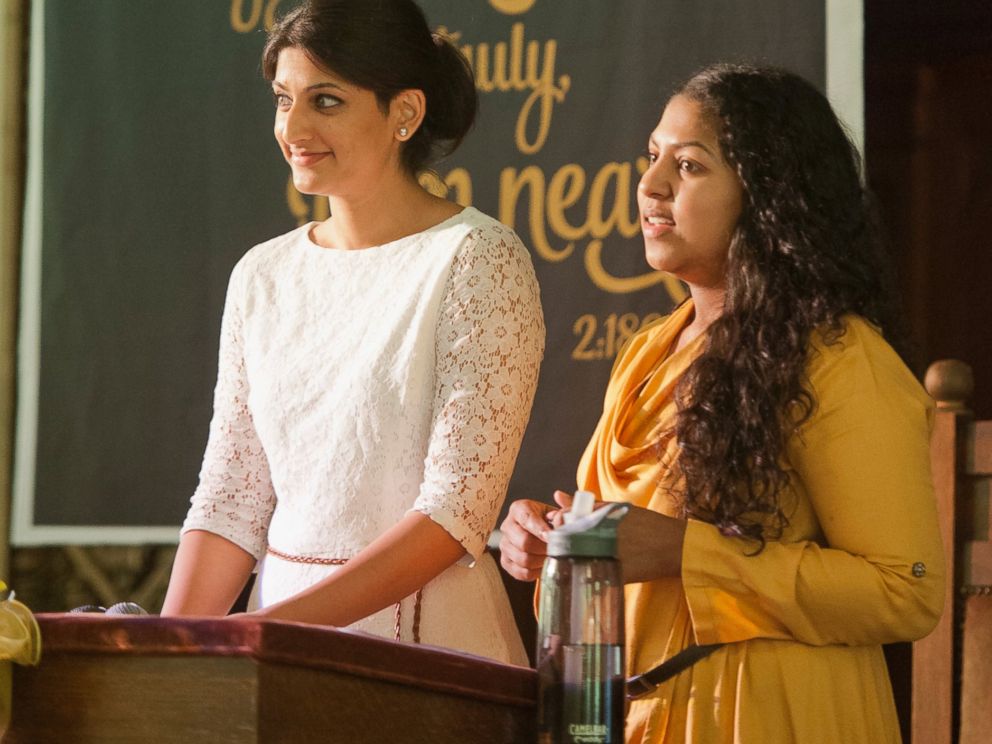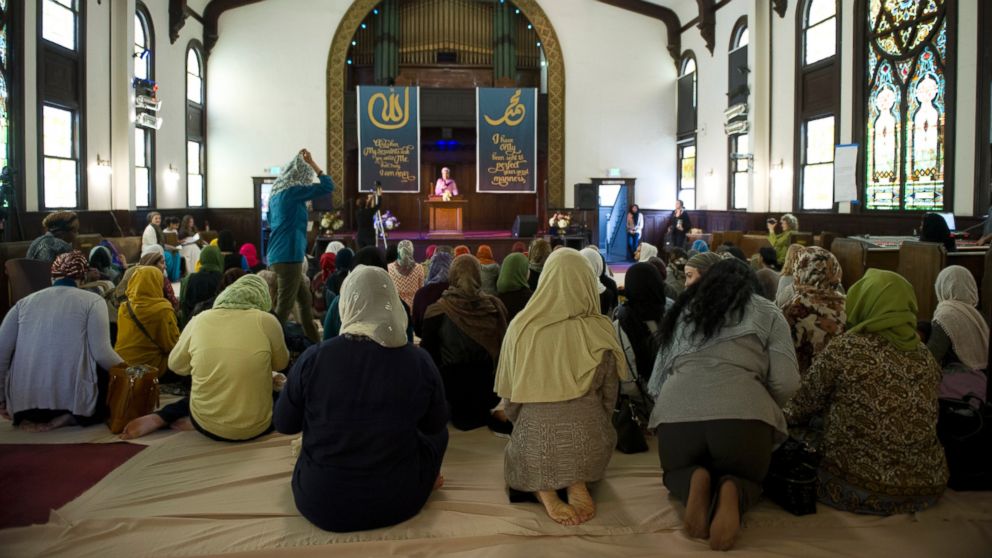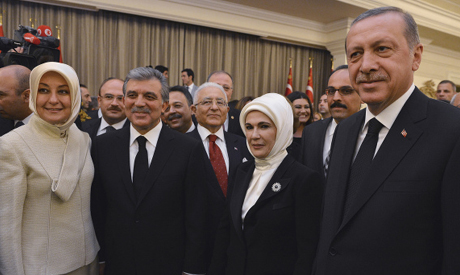Feeling Unwelcome at Mosques, 2 Women Start Their Own in L.A.
New Entity Believed to Be the First of Its Kind in the U.S.
..New Entity Believed to Be the First of Its Kind in the U.S.
Zaiba Omar, left, and Hasna Maznavi, right, hang banners for the Women's Mosque of America’s first service this week. PHOTO: STUART PALLEY FOR THE WALL STREET JOURNAL
LOS ANGELES—When Hasna Maznavi would show up to pray at her Southern California mosque, even during off hours, the few men in the main hall would gently point her upstairs to a separate area for women.
“I started to feel unwelcome,” said the 29-year-old comedy writer and film-school graduate.
To Ms. Maznavi and fellow Muslim Sana Muttalib, a 31-year-old lawyer, the traditional separation was more than physical. Muslim women across the country, they believed, seemed disconnected from their scholarly heritage, and too few had leadership roles in their mosques.
So Ms. Maznavi and Ms. Muttalib decided to start their own mosque—one for women only.
On Friday, when they gather in Los Angeles for the first Friday prayer service at the new Women’s Mosque of America, worshippers won’t enter through a side door or have to sit in the rear. The call to prayer, traditionally performed by a man, will be given by a woman, as will the sermon.
Sana Muttalib, left, and Zaiba Omar in the Pico-Union Project while setting up for the Women's Mosque of America’s first service in Los Angeles on Thursday. PHOTO:STUART PALLEY FOR THE WALL STREET JOURNAL
The women may also be making history. While female-only mosques exist in China, Islamic scholars and Muslim leaders here said they know of no other such mosque in the U.S.
“This is a hugely important, symbolic moment,” said Edina Lekovic, a 37-year-old Muslim activist from Pasadena who is giving the sermon. “It’s American Muslim women organizing and creating a space for their own spiritual nourishment by and for themselves.”
Some mosques draw on members of the lay community to lead prayer and give sermons, especially as American Muslims grapple with a shortage of trained imams. And it’s not uncommon for Muslim women to lead women in prayer in small, informal groups. But offering Friday prayers—the major service of the week—is a notable step.
Many younger Muslims raised in the U.S. are agitating for broader changes to mosques, or turning away from traditional mosques in favor of their own “third spaces.” This comes as more mosques arepopping up to meet demand from the rising Muslim population in the U.S., and at a time when the community is under increasing scrutiny after deadly terrorist attacks abroad linked to Islamic radicals.
The traditional separation of men and women, compounded by traditions carried over from immigrants’ home countries and the Islamic imperative for men to attend Friday prayers, has created a striking imbalance in American mosques, Muslim leaders, women and academics said. According to study released in 2013 from the Islamic Society of North America, U.S. mosques reported attendance at Friday prayers on average was 18% female. Most mosques in the study scored fair or poor on a “women-friendly” scale.
Zaiba Omar, treasurer and board member at the Women's Mosque of America tapes down rolls of fabric for use in the mosque's first service this week. PHOTO: STUART PALLEY FOR THE WALL STREET JOURNAL
“The mosque will have to evolve to become more inclusive of women if it wants to remain relevant,” said Hind Makki, a 35-year-old Muslim woman in Chicago who consults with mosques on inclusion.
There is general agreement among various schools of Islamic thought that women can lead other women in daily prayers, said Jihad Turk, an imam and president of Bayan Claremont, the Islamic graduate school at Claremont School of Theology in Southern California. He noted there is precedent in Muslim history of female scholars and teachers, including the Prophet Muhammad’s wife, who led women in prayer.
But Islamic scholars are less in agreement over whether women can lead the special Friday prayer that is proceeded by a sermon. One solution might be to perform the regular daily prayer in addition to the Friday prayer to fulfill Islamic obligation, scholars suggested.
“This is something that has no precedent in history or tradition,” Muslim American scholar Furhan Zubairi wrote in a piece posted online Friday about the Women’s Mosque, referring to women leading the special Friday prayer. “The issue of precedence isn’t something that should be taken lightly.”
But Mr. Zubairi said there is “nothing wrong with having a Women’s Mosque,” saying women should have “spaces where they feel safe, welcomed and respected.”
Mr. Turk said he has heard from a few conservative leaders who have expressed concerns over “whether this is somehow a slap to the face of the established community.” Some people, he added, “might take offense, and some are saying you should just work with the community [for change] instead of creating your own.”
Nearly two years ago, Ms. Makki launched Side Entrance, a website where Muslim women post photos of women’s entrances and worship space at mosques around the world. It began when Ms. Makki ducked into a mosque to pray and posted a photo of the cramped women’s area on her
Facebook
page. Her female friends commiserated, she said, but her “male friends were shocked. Most men don’t know where their sisters, wives or moms go to pray.”
The Pico-Union Project, where the Women's Mosque of America will hold its first services this week in Los Angeles. PHOTO: STUART PALLEY FOR THE WALL STREET JOURNAL
She said she is hopeful the new women’s mosque will “bring this issue to the forefront. If women are feeling so excluded that they’ve created their own mosque, that shows you how desperate the situation is across the nation.”
For now, members of the Women’s Mosque will gather in a former synagogue that is now a multifaith center, in an industrial neighborhood just off downtown L.A. Its founders say it will serve as a “complement” to worshippers’ home mosques, not as a replacement. They hope to offer classes on the Quran, host female Islamic scholars and encourage women to take more active roles.
“This is a place where Muslim women can come and experience inspiration and then return with that to their communities,” Ms. Maznavi said. “We would love to not have to exist.”
e women sit on their knees, watching intently as a slightly sheepish sister in a pink head scarf crosses the beige floor and approaches the dais. After a moment, her jitters are gone and, in a booming voice, she recites the Islamic call to prayer.
In what may have been a unique moment in America, more than 100 women gathered Friday at the interfaith Pico-Union Project. While many mosques continue to follow a tradition of separating women from male congregants, the downtown Los Angeles mosque forbids men from attending.
Female-only mosques may exist in China, Chile and India, but Muslim leaders say this could be the first in the U.S.
The inaugural prayer Friday marked the launch of the Women's Mosque of America, a nonprofit that hopes to create a space where Muslim women can "bring their whole self," learn more about their faith and foster bonds of sisterhood.
"Muslim women haven't had a forum," Yasmeen Ruhge, a cardiologist from Pasadena, said as she waited for the service to begin. "When we go to the mosque we have to sit on one side. Not that we aren't equal, but this gives us a freedom to talk as all women and create an independent role."
About two-thirds of U.S. mosques use a divider to separate men and women during morning prayers, according to a 2011 study on American mosques co-sponsored by the Islamic Society of North America. That figure could be higher for Friday prayers, the study said.
Because many spaces for women in many mosques are not as appealing or accessible as the areas for men, an open environment is integral for growth, said Sana Muttalib, co-president of the women's mosque. Often, women are forced to enter through side or back doors to reach their segregated areas, she explained.
In most mosques, women are hard-pressed to find the opportunity to ask the imam questions after prayer. But on Friday, a female speaker (or khateeba) addressed women's issues and held a discussion circle after the prayer service.
Many women expressed their gratitude at the chance to share their thoughts. Some cried and called the experience liberating.
But a lack of female perspective isn't unique to the Muslim community, said M. Hasna Maznavi, who started the organization with Muttalib. Although the prayer space is for women only, other events and classes will be open to men.
"When only half of the membership is contributing to the success of the whole, we're not going to be as well-off as we could be," she said.
The new mosque has been embraced around the globe, not just nationally, Muttalib said. She said support has come, not only from women eager to learn more or hoping to start their own chapter, but from men.
The call for female empowerment in the Muslim community has been growing for years — a response aimed at combating an often-misguided view of Islam, experts say.
"One of the major ways that Islam is 'othered'— one of the major stereotypes — is how they treat women," said Ruqayya Khan, chairwoman of Islamic studies at Claremont Graduate University. "But there is a rich history of women in Islam, and it's often kind of sidelined or buried."
Both Muslim women and men can work to reclaim the importance of those female figures, she said. Female empowerment is an important step, Khan said, because it is not an "in-your-face, radical" move, yet it still supports female Muslim leaders.
"Maybe out of this space we could find a woman who is able to think in terms of reform in Islam," she said. "Maybe we could get a female Luther out of this. Wouldn't that be exciting?"
For Ani Zonneveld, head of Muslims For Progressive Values, the new mosque presents an opportunity to help women feel more comfortable and set an example for future generations.
"It's about spiritual leadership," Zonneveld said. "When women bring their young boys and they see women leading the prayer, they can initiate change as they grow up."
http://www.wsj.com/articles/muslim-women-to-launch-their-own-mosque-1422639983











